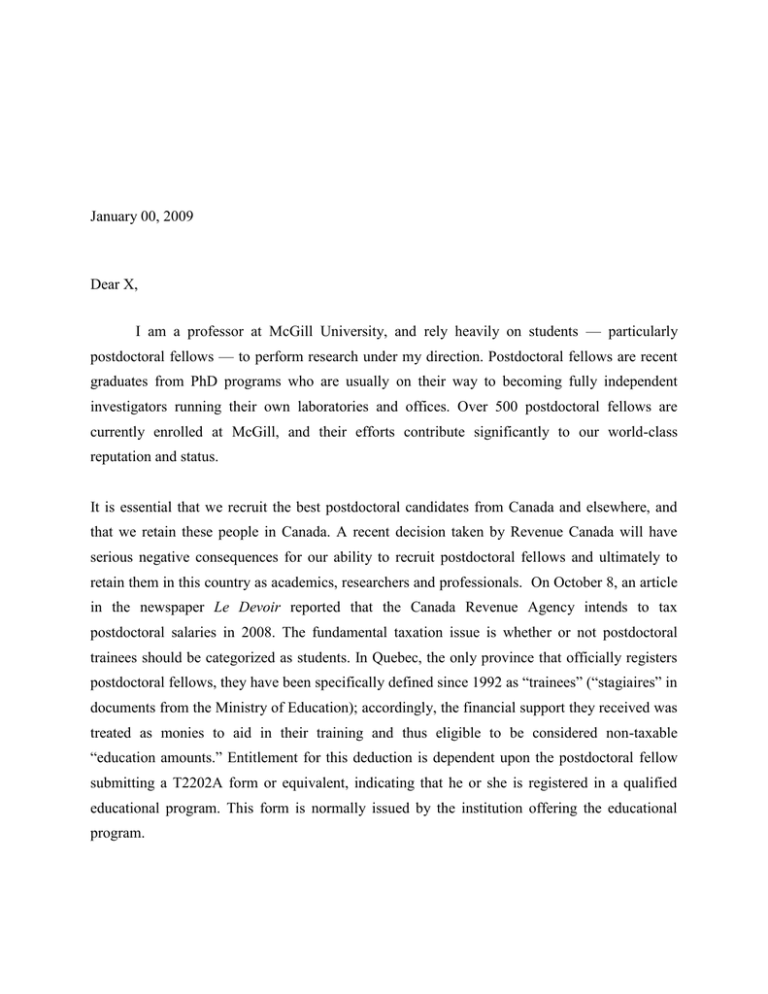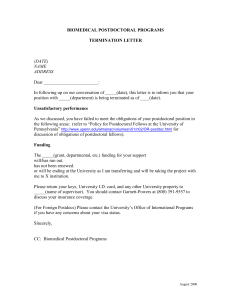January 00, 2009 Dear X,
advertisement

January 00, 2009 Dear X, I am a professor at McGill University, and rely heavily on students — particularly postdoctoral fellows — to perform research under my direction. Postdoctoral fellows are recent graduates from PhD programs who are usually on their way to becoming fully independent investigators running their own laboratories and offices. Over 500 postdoctoral fellows are currently enrolled at McGill, and their efforts contribute significantly to our world-class reputation and status. It is essential that we recruit the best postdoctoral candidates from Canada and elsewhere, and that we retain these people in Canada. A recent decision taken by Revenue Canada will have serious negative consequences for our ability to recruit postdoctoral fellows and ultimately to retain them in this country as academics, researchers and professionals. On October 8, an article in the newspaper Le Devoir reported that the Canada Revenue Agency intends to tax postdoctoral salaries in 2008. The fundamental taxation issue is whether or not postdoctoral trainees should be categorized as students. In Quebec, the only province that officially registers postdoctoral fellows, they have been specifically defined since 1992 as “trainees” (“stagiaires” in documents from the Ministry of Education); accordingly, the financial support they received was treated as monies to aid in their training and thus eligible to be considered non-taxable “education amounts.” Entitlement for this deduction is dependent upon the postdoctoral fellow submitting a T2202A form or equivalent, indicating that he or she is registered in a qualified educational program. This form is normally issued by the institution offering the educational program. The article in Le Devoir referred to a letter that was sent this past summer by the Canada Revenue Agency to the Conférence des recteurs et principaux des universités du Québec (CREPUQ). The letter indicates that the Agency does not consider postdoctoral trainees to be students according to the law, not eligible to receive T2202A forms, and hence no longer eligible to deduct the full amount of postdoctoral salaries from their Federal income tax. Provincial governments are likely to follow suit, making this situation even more difficult. The policy as it existed added value to money granted by agencies such as CIHR, NSERC, SSHRC and charitable organizations. As very good laboratories and research groups begin to lose personnel due to this policy, so is their expertise and potential contribution to Canada lost, undermining the infrastructure of basic research. Basic research is a national resource; taxing postdoctoral trainees may save money now, but at an enormous cost in the future. Postdoctoral fellows are not paid exorbitant salaries. Many of them are at the stage in their lives where they are just establishing homes and starting families, and this will impact them drastically. The arbitrary nature of the decision to tax 2008 earnings is unexpected and therefore particularly punitive. Therefore, I am writing to draw your attention to the extreme importance that Canada's academic community attaches to the need to protect this vulnerable cohort of scholars. As a researcher, and as a member of your riding, I should like to urge you to use your influence in Parliament to alert the Government to the critical importance of maintaining a forward-looking policy with respect to Canada’s future. Yours Sincerely, P.S. The courtesy of an acknowledgement of receipt of this communication would be very much appreciated.

